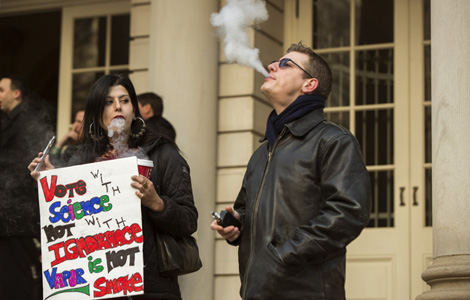Stop double standard on terrorism
Updated: 2013-12-20 07:10
By Zhou Zunyou (China Daily USA)
|
||||||||
A group of terrorists, armed with daggers and homemade bombs, attacked police officers investigating terrorist activities in Shufu county of the Xinjiang Uygur autonomous region on Dec 15. The clash that ensued left 16 people - two police officers and 14 attackers - dead. Six suspects have been arrested with incriminating evidence during the investigation and raids that followed in the county, which is administered by Kashgar.
For the Chinese government, the Shufu attack is another act of terrorism - the latest in the list of Uygur-related terrorist attacks this year. For the Western media, however, the incident is another reaction to China's "restrictions on the culture, language and religion ... in energy rich Xinjiang". The US response to the attack once again exposes the double standard the West uses in the global fight against terrorism.
The US played the same game even after the terrorist attack in Beijing on Oct 28. While China said the jeep crash on Tian'anmen Square was a terrorist attack, the US refused to refer to it as an act of terrorism and the US media stood by their government. CNN even published an op-ed article titled, "Tian'anmen crash: Terrorism or cry of desperation?" by Sean R. Roberts. This evoked a barrage of criticism from Chinese media outlets, which accused Roberts of sympathizing with terrorists and using double standard in the fight against terrorism.
To get to the bottom of the dispute, it is necessary to take a look at the terrorist attacks through the US' official lens, or how the State Department, the FBI, and the departments of Homeland Security and Defense describe terrorism. They use four basic factors: Terrorist acts are perpetrated by non-state entities, they involve violence or the threat of violence, they are designed to have psychological impact far beyond the immediate victims, and they have a political aim.
Investigations into the Shufu attack have revealed that the assailants were part of a 20-member terrorist group, led by a man identified as Hasan Ismail. The group had watched videos on terrorist violence and extreme religious propaganda, and used bombs and daggers to attack the police officers when the latter were pursuing criminal suspects in Sayibage township.
In June, rioters in Shanshan county of Xinjiang killed 24 people, 16 of whom were from the Uygur ethnic group, and injured 21 police officers and civilians.
The two attacks, even according to US official definition, qualify as terrorist acts, because they were carried out by organized groups, involved violence that claimed innocent people's lives, were meant to spread panic and fear beyond the immediate victims, and had clear political aims.
According to the official US definition, an attack does not have to be carried out by a recognizable organization to be termed terrorism. The reason: "lone wolves", motivated by ideology of a terrorist movement and operating outside any command structure, could launch extremely destructive attacks and therefore present a greater threat than organized groups.
All these factors, plus more, were present in the Shufu and Shanshan attacks but still the US continues to use double standard in the fight against terrorism.
In fact, some Western media outlets have based their analyses on the following argument: Crude instruments used in the Xinjiang attacks suggest they were not the work of a well-organized group, and there is no evidence to show that Uygur rioters are involved in large numbers in the global Islamic terrorism movement. Such an argument, however, is neither vital for the American definition of terrorism, nor can it be used to justify a terrorist act.
The point will become clearer if one compares the Shufu and Shanshan attacks with the Boston marathon bombing in April that left three civilians dead and more than 200 injured. The two brothers suspected of carrying out the attacks were "lone wolves" and had no organizational connection with any terrorist group. Their motive was to defend Islam from the US that has "devastated" Iraq and Afghanistan, and the weapons they used were two homemade (pressure-cooker) bombs. US President Barack Obama was quick to call the Boston marathon bombing "an act of terrorism", saying that if "any time bombs are used to target innocent civilians, it is an act of terror".
China, in sharp contrast to the US' double standard, condemned the Boston marathon bombing and showed its solidarity with the American people.
But despite the Boston bombing and Xinjiang attacks being strikingly similar in nature, the US refuses to term the latter as acts of terrorism. The use of double standard by the US-led West is blocking a universal agreement on the definition of what constitutes terrorism. And the lack of a globally binding definition of terrorism is seriously undermining international efforts in the fight against terrorists.
The author is head of the China section at Germany's Max Planck Institute for Foreign and International Criminal Law.
(China Daily USA 12/20/2013 page16)

 New York mulls banning e-cigarettes
New York mulls banning e-cigarettes
 Climbers soar to new heights
Climbers soar to new heights
 Reading China's future through its past
Reading China's future through its past
 Yanukovich offers Ukraine protesters nothing
Yanukovich offers Ukraine protesters nothing
 Former NBA player may coach in DPRK
Former NBA player may coach in DPRK
 AVIC unveils plan for next-generation regional aircraft
AVIC unveils plan for next-generation regional aircraft
 Misses International shine in Tokyo
Misses International shine in Tokyo
 Parents urged to supervise children's TV-viewing habits
Parents urged to supervise children's TV-viewing habits
Most Viewed
Editor's Picks

|

|

|

|

|

|
Today's Top News
China, US start annual trade talks
New York mulls banning e-cigarettes
Verizon plans more data-request disclosures
88 injured in London theater collapse
'Deportation relief' important to Asian Americans
Reading China's future through its past
New US ambassador 'must find right mix'
Senators push Iran sanctions bill
US Weekly

|

|







